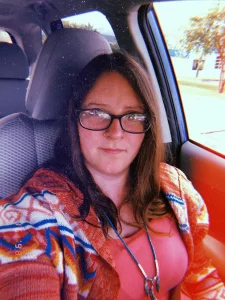Editorial Note: The following is reprinted with permission from Eleanor Skelton’s blog. It was originally published on October 15, 2019.

It’s just not worth it to live with secrets.
My social media feeds have been flooded with National Coming Out Day posts over the last week, and I realized while reading through them that it’s such a relief to able to tell people the truth, to not have to hide anything.
I keep thinking about October three years ago when I started telling people at my church that I dated women, that I was in a relationship with someone in college who broke my heart, that I’m attracted to someone’s soul more than their gender.
I took a big risk. Someone who hasn’t been in that kind of situation might not understand that risk.
I really didn’t know what my church people would do.
I had only moved back to my childhood home, back to the first church I could remember about a year before, and of course, I hoped they wouldn’t cast me out like the fundamentalist cult I’d been in as a teenager did, for so much less. But I had no guarantees.
You learn who loves you unconditionally when you start telling people who you really are and seeing what they do next.
A friend once told me that sin could be defined as “treating people like objects” — essentially not valuing other human beings. It resonated with me because it puts most of Christian theology and doctrine into one idea.
After I started telling people about who I had dated, Christian friends I’d known for years had told me I was no longer welcome in their homes to hang out with other friends, that they could no longer speak to me, as if being gay was contagious and they might catch it.
I already knew how some people in my family felt about LGBT people.
Growing up, I was told not to eat my cousin’s cranberry sauce at Thanksgiving because “he lives with his boyfriend and we don’t know how clean their house is.”
They didn’t exactly say it, but their words hinted at fears of catching AIDS from dirty kitchen utensils.
But still my secret kept burning on the inside.
I couldn’t pretend that I didn’t feel this way, even though it was costing me so much to be honest and open.
Reading this, you might think my church is affirming. They aren’t, but that’s okay and here’s why. They showed me that they accept me just as I am, even if they didn’t agree with my choices.
Two of my pastors gently guided me and went out of their way to show me that they didn’t see me any differently than before they knew. They told me they believe that we all have different issues and no one’s secrets are any worse than anyone else’s.
And this meant the world to me.
Through their love, I grew more confident. I learned to hold my own in the world. I stopped cycling through romantic relationships with people who were using me.
Because they valued me, I started to value myself.
I realized if sin was objectifying human beings and not recognizing their value, how I had been living was a sin, because I was letting people treat me as an object. I started believing I was worth more.
If I said I wasn’t gay anymore, that would be a lie. I am still attracted to women. Getting baptized again didn’t change that either — even if some of my relatives thought it did.
Now, I ended up choosing side B, the celibacy option, but that’s wasn’t really about “trying to not be gay” — it was about making healthier, wiser choices. You can read more about that part of my story over here.
And if I find someone one day that I want to marry, great. If not, that’s ok, too. I also don’t believe anymore that you have to find a partner to be complete.
Now I believe everyone is made whole as they are and they don’t need other people to make them whole, and if you’re not feeling that just yet, that’s ok, and you might not be quite done healing.
I’m not going to get into the semantics of whether or not people should say they’re gay or that they’re someone with same-sex attraction because I don’t think that’s ultimately helpful. (I’ve heard the “you shouldn’t be identifying with something that’s a sin” argument — I’m using the term to describe how I am, it’s just a label that helps explain how I feel.)
And I’m not here to argue about LGBT issues — whichever side you’re on doesn’t really matter to me for the purpose of what I’m saying.
I’m just asking you to treat other people as humans equally deserving of respect. And just listen to their stories. Let them tell you their secrets, and don’t recoil when it’s something you’re not expecting.
This is how they’ll feel safe around you. And this is how they will heal.
If you’re reading this and you’re still part of my story, thank you for sticking around through the rough patches and loving me so well.
********
Shop at our Amazon store! As an Amazon Influencer, this website earns from qualifying purchases.
